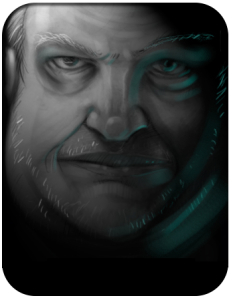DETECTIVE MOXLEY, Part 24: “Squibbily Bibbity Blam Blam”
“You don’t look too bad,” said Weber.
Moxley, once more in the passenger seat, stared at the traffic. Everything was snarled as they crawled through a detour. A pair of drones had struck one another and landed on a pedestrian. It happened more often than anyone liked to admit.
When Weber kept staring at him, Moxley turned back to him and nodded. “It wasn’t what I thought it would be.”
“Never is,” said Weber.
“I wasn’t sure if I belonged there,” said Mox. “I thought maybe it was an excuse. Just a way to duck everything for a few more weeks. Then I started listening to the other patients. Some of the things they said… It could have been me. It could have been my story.”
“How do you think I knew?” said Weber. He didn’t look at Moxley now; he was focused on negotiating the congestion before them. Emergency services was on the scene and had placed a tarp over a portion of the crash area. The tarp was never a good sign. They always used a tarp when someone was dead.
Moxley blinked. “You?”
“Me, kid,” said Weber. “Why you think I don’t worry about people whose pasts are a little dinged up? We all screw up. Some of us screw up so big we start over. And some of us never get that chance. I saw the signs in you, Harry. But don’t forget, I know you. You weren’t gonna listen to me. You had to scrape bottom yourself before you’d see it. I hadda let you.”
Moxley was silent for a time. Finally, he said, “Are you really going to give me your car?”
“I’m really going to give you my car,” said Weber. “You take care of her, Harry. I’ve put a lot of money into this thing. This car is going to save your life one day.”
* * *
“Whippoorwill,” said the Dayliner’s computer. “Status mobility far from trade diamonds.”
Most of the status readouts in the dash didn’t work. They hadn’t for years. Moxley thought the car was still functional, though. The Dayliner was a big, bloated machine, with a reinforced chassis and shielding for the drive motors. Shaking himself, trying to make his eyes focus, Mox wiped blood from his forehead with the back of his hand. Through the Dayliner’s filthy windshield he saw men in black combat fatigues filing out of the back of the lorry that had struck him.
“Uh oh,” said Mox. The men carried chemical assault rifles and were moving to surround his car. Moxley looked left, then right. Traffic on the street and in the air overhead was flowing around them for the moment, but as soon as the gunmen opened up, every public alarm in the world was going to go off. He was still in the Hills, where the wealthiest residents of Hongkongtown, the most powerful among those on the atoll, commanded considerably more infrastructure and protection. Here, the streets were wider, the pedestrians better dressed. Here, there were fewer pedicabs and many more ground cars, all of these expensive. Here, even the drones overhead flew in more orderly, less cramped formations. There were hardly any overhead cables here, either, as residents of the Hills could afford to have power and communications routed and rerouted beneath the paving. Even the air smelled less acid.
The gunmen took up positions around the Dayliner. Mox watched the leader of the squad hold his arm up, bent at the elbow. He was about to make the command to open fire.
This car is going to save your life one day.
Moxley reached under the Dayliner’s dash, found the lever, and wrenched it.
“Squibbily bibbity blam blam,” said the Dayliner.
Metal shields shot up overt the windows. The rear shield did not extend completely, leaving a hand’s width crack between its top edge and the roof of the car, but it would be enough. The nose of the Dayliner belched pneumatic discharge as the snout of the nail-cannon extended. Smaller pipes appeared on the sides and rear of the heavy car.
The black-clad gunmen were shooting now. Rounds ricocheted off the Dayliner’s armor plating. That armor was the reason the car wasn’t a crumpled wreck. It was also the reason the machine burned through so much fuel. A couple of rounds cracked the treated panel of the rear windshield.
“Squibbily blam blam,” repeated Mox, and clenched his index fingers on the steering wheel.
Gouts of fire leapt from underneath the Dayliner’s chassis. The tongues of burning chemical were sticky. Whatever they touched, they consumed. Even over the sound of the gunfire, Mox could hear the screams of the men he was incinerating. Through the slats of the armor plating, he watched vehicle and foot traffic flee in the opposite direction, effectively creating a cordon around the Dayliner and the lorry. Which meant he wouldn’t need to worry about hitting anyone who didn’t have it coming.
He hoped the Dayliner’s faulty computer hadn’t already redefined the firing command for the cannon. The car always repeated whatever it thought the codes were, but these changed at random intervals. Whether it was a security measure or just the AI unit’s madness, Mox did not know.
“Bibbity,” he said, and tightened his fingers again. Now the nail gun began barking. He turned the steering wheel left and right, guiding the cannon by shifting the nose, walking his projectiles over the men who sought to kill him. There were more screams. There was a great deal of blood.
“Shoop,” said the car. “Your magazine is cattailed.” The nail gun began whirring away on empty, its pistons opening and closing. Moxley pried his fingers from the wheel and the mechanism stopped.
The gunmen were all down. He couldn’t hear any sirens yet, but the Goops would eventually get here. He didn’t like his chances if he had to talk his way clear, not after the incident in the Wanfujing. He slammed the car into drive and urged it forward. One of his wheels struck a corpse and carried the Dayliner up and over it.
“Sorry,” said Mox to nobody.
But he wasn’t sorry. Not even a little.


